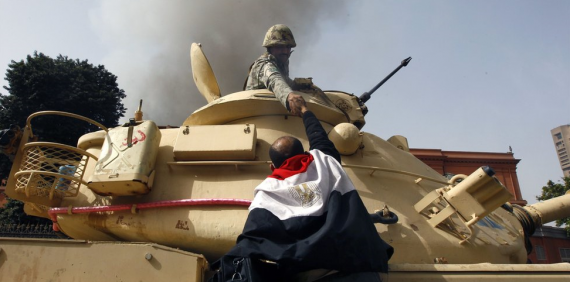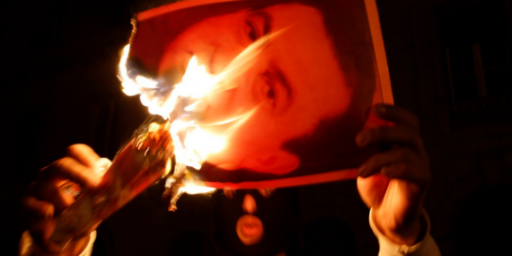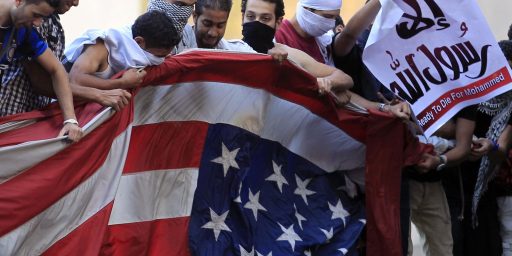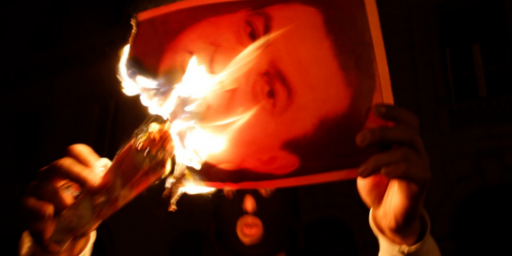Egypt’s Future Is In The Hands Of The Military
As protests continue despite President Mubarak’s efforts to placate them, it’s more clear than ever that what happens next in Egypt depends on what the Egyptian military does:
Even as armored military vehicles deployed around important Egyptian government institutions on Friday for the first time in decades, it remained difficult to predict what role the armed forces might play in either quelling the disturbances or easing President Hosni Mubarak from power.
“Are they on the side of the nation or are they on the side of the regime?” a former senior Western diplomat with long service in Cairo asked. “That distinction had been blurred. We are now seeing a modern test of whether there is a separation between the two.”
The Egyptian military, the world’s 10th largest, is powerful, popular and largely opaque.
The military carried out the 1952 coup that overthrew the monarchy and has considered itself the shepherd of the revolution ever since; all four presidents in the ensuing years have been military generals.
But Mr. Mubarak, who led the Air Force before rising to prominence when President Anwar el-Sadat appointed him vice president in 1975, worked hard to keep the army out of overt politics and under his control.
In one famous incident, he dismissed Field Marshal Abdel-Halim Abu Ghazala, a popular, charismatic war hero, from his post as defense minister in 1989. The general had been tied to a smuggling scandal, but most analysts thought he had been fired because his public profile was too high.
No general has sought to curry public favor since. The current defense minister, Field Marshal Mohamed Hussein Tantawi, an unpopular man in his late 70s, is considered unlikely to challenge Mr. Mubarak.
When Tunisia exploded in chaos this month, the decision of the military chief not to fire on protesters was seen as a decisive factor in driving President Zine el-Abidine Ben Ali out of the country. No one thinks a Mubarak loyalist like General Tantawi would play that role, but at some point his top subordinates might consider it. (Senior members of the general staff were in Washington when the violence erupted and hurried home.)
The army commands broad respect in Egypt. Demonstrators cheered on Friday as tanks deployed in front of government buildings like the Foreign Ministry and the main broadcast center. The demonstrators were partly inspired by the Tunisian example, analysts said, and some hoped that the military might play a similar role in Egypt.
The public’s respect contrasts sharply with the prevailing view of the police and other Interior Ministry forces, who are known for brutality and nicknamed “bultagia,” or thugs, by Egyptians.
Egypt’s military, with about 468,000 soldiers, is an institution apart, with its own social clubs and shopping centers. It has expanded over the decades into civilian areas like real estate development and engineering.
It has also provided a means of social advancement, where men from poor families can earn prestige and join the upper middle class. Mr. Mubarak has appointed retired generals to run most provinces and important state-run companies.
But deploying tanks is a sign of desperation, and raises the question of when the military might begin to doubt Mr. Mubarak’s viability. The tipping point could come, analysts believe, if the military is ordered to fire on demonstrators in any large numbers. It is one thing to protect government buildings from looters, but something else to tarnish the reputation of the army by killing citizens, they said.
“If the military fires on civilians after demonstrations that are clearly popular, that will imperil the standing of the military, its integrity,” said Samer Shehata, a professor of Arab politics at Georgetown University. “This time the institution’s future is at risk.”
So far, the military seems to be staying out of crowd control and limiting its role to protecting government buildings, embassies, and national treasures like the Pyramids at Giza. If the protests continue and the military doesn’t crackdown, it could be a sign that Mubarak is done.
Photo via BBC






![Military Coup Underway In Egypt [Update: Morsi Deposed]](https://otb.cachefly.net/wp-content/uploads/2011/02/egypt-flag3-512x256.gif)
Historically the Muslim Brotherhood had small cells inside the military. The assassination of Sadat was the result of that activity among junior officers. I wonder how much infiltration the MB has had in the current military and what are their abilities to incite the conscript force to disobey orders?
This is an example of just what the Oath Keepers are talking about – that if the military does the right thing and sides with the people, there can be no dictatorship that can stay in power when the people stand up, and when it comes to here in the United States, there can be no dictatorship that takes power if the military and police do not go along.
Yes, an overthrow of the dictatorship in Egypt could end badly, as it did in Iran, but it could also go well, and bring in a real representative government rather than a dictatorship.
Check out this article:
http://oathkeepers.org/oath/2011/01/29/the-egytian-military-are-they-on-the-side-of-the-nation-or-are-they-on-the-side-of-the-regime/
i agree with american veteran, salute
One might recall that back during the French Revolution, the French army, after first firing grape shot on the crowds, turned and fired on the Bastille. During the abortive Hungarian uprising in ’56, Russian T-34s swung their mounts around and loosed rounds at the offices of the Stazi—-the soviet secret police in Hungary. We’ll just have to see how this plays out….but I am concerned that someone would see fit to deface the mummies in the Egyptian National Museum….I’ve been in that place and hearing about that made me sick….that sounds like something the Mossad would have done and I can only wonder just how much of a hand the Mossad is taking in this disruption…or perhaps much more accurately, how much advantage they will take of it even if they originally had nothing to do with inciting it.
I find Mossad having something to do with this uprising as not to their benefit. They have had peace with Egypt for over 30-years, and it would not be in their best interests to side with any venue in Egypt. On the other hand, the Muslim Brotherhood has much more to gain. If they wind up with any power in Egypt, you can expect to see they take action against Israel once again. Obama’s nonpolicies concerning Egypt has given the Brotherhood they wanted, and needed, to take action.